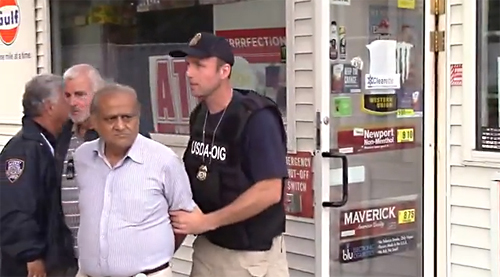Riverhead man headed to prison for food stamps fraud

The owner of a Riverhead gas station and convenience store was sentenced to up to four years in prison for stealing more than $668,000 from the federal Supplemental Nutrition Assistance Program over a four-year period.
Ravinder Parkash, 60, of Riverhead pleaded guilty in January to all counts on a federal indictment including second-degree grand larceny, second-degree menacing and conspiracy. He was sentenced Wednesday to 1 and 1/3 to 4 years in state prison by Suffolk County Supreme Court Justice John Collins.
Mr. Parkash, who owns the Gulf station next to the aquarium on East Main Street in Riverhead, also was ordered to pay $566,011 in restitution to the federal government, according to state Attorney General Eric Scheiderman, whose office conducted a multi-year investigation into the SNAP fraud along with the U.S. Department of Agriculture, which runs the SNAP program formerly called Food Stamps.
ALSO IN POLICE NEWS:
• Driver in critical condition following Route 105 crash
• Robbery suspects held on bail following arraignments
• Cops: Serial jewelry burglar hit Aquebogue, Jamesport homes
Between April 2010 and May 2013, Mr. Parkash conspired with his wife, Prabha Rani, 59, and his corporation, Shivani Enterprises, Inc., to use the Gulf gas station and convenience store to exchange SNAP benefits for cash, according to Mr. Schneiderman.
Mr. Parkash then laundered the proceeds of his illegal scheme by using a bank account set up to process New York State Lottery sales at the store.
Prabha Rani also pleaded guilty to the indictment for her role in the scheme, and on April 17, 2015 she received a 60-day jail sentence.
The investigation revealed that Mr. Parkash engaged in fraud known as “SNAP Trafficking,” according to Mr. Schneiderman.
In a SNAP Trafficking scheme, the vendor conspires with individual SNAP recipients to ring up purported grocery sales, but no goods are actually sold.
Instead, the shop owner or employee gives half or some portion of the sales price to the SNAP recipients in cash and keeps the rest of the money for themselves. The USDA is then charged the full value of these phony transactions, Mr. Schneiderman said.
“These schemes not only ripped off taxpayers, but also the many New Yorkers in need who depend on food stamp benefits,” Mr. Schneiderman said.
He said that in the wake of Hurricane Sandy, the USDA provided emergency benefits to all SNAP recipients in affected areas, including Suffolk County, without regard to need, and that many of these SNAP recipients exchanged these Sandy benefits for cash with Mr. Parkash.


